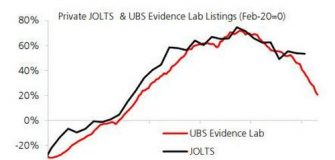An Antitrust Funeral Oration
Share


My fellow Americans, read this closely; I come to bury conservative antitrust, not to praise it. Reports of a new Republican Party have perhaps been overstated, once again; the dog returns to its vomit, especially when forced to govern. What might be done by a House judiciary subcommittee on “antitrust, commercial, and administrative law” can be killed and interred with a changed name and a new chairman. So let it be with this new House judiciary subcommittee, on “the administrative state, regulatory reform, and antitrust.”
The noble Representative Jim Jordan of Ohio has told us, in action if not in words, that bipartisan antitrust was ambitious; if it was so, it was a grievous fault, and grievously has the conservative effort to rein in Big Tech answered for it. Jordan tells us that Kentucky’s Representative Thomas Massie will be a better chair than Colorado’s Representative Ken Buck, for as the new subcommittee name makes clear, this Republican-led body will be focused on deregulation, and antitrust will be left in final place. So, here we are, in the Republican Congress of Jordan and Speaker Kevin McCarthy and all the rest—for Jordan is an honorable conservative; so are they all, all honorable conservatives—reflecting on the unfought House fight against Big Tech, at what amounts to Republican antitrust efforts’ funeral.
Antitrust was once a Republican issue, faithful and just to the causes of localism and regionalism, of self-rule and competition. Of course, consider President Theodore Roosevelt, a son of that Grand Old Party, buster of bad monopolies and mergers, and protector of good American trade and fair prices for American goods. Remember also that Senator John Sherman of the Sherman Act was a Lincoln Republican. And President Benjamin Harrison was a Republican, too, signing that first antitrust bill into law. But, as Rachel Bovard has written:
Too many on the right conflate antitrust enforcement with regulation, when the two are quite distinct. Antitrust is targeted law enforcement. It addresses specific acts of marketplace conduct that must be thoroughly investigated by the Department of Justice or the Federal Trade Commission, and proven before a judge, before the law is enforced.
Republicans today appear to have forgotten that it is things like anticompetitive behavior and cartel pricing that drive demand for government regulation—in a world where Meta did not own Instagram and WhatsApp, too, it would matter less how Facebook monitors and polices speech; in a world where Meta did not own Instagram and WhatsApp, Facebook would be less tempted to ask the federal government to set standards for its industry, to regulate out of existence any upstart competition.
Subscribe Today
Get weekly emails in your inbox
But Jordan seems to think antitrust is too ambitious for a Republican House majority, despite what he has said about breaking up large technology companies in the past; and Jordan is an honorable conservative. A more competitive technology sector, back when our giants were smaller companies—each monopolistic in first zero and then one thing, but not in many—brought growth and dynamism and innovation to the American economy. And U.S. companies headquartered in the U.S. and focused on the U.S., their taxes did the general coffers fill. Indeed, antitrust enforcement prevented Microsoft from choking Google in the cradle and robbing the world of a search engine that worked, at least for a little while. Did this in fighting Big Tech seem too ambitious? When the poor have cried for their shuttered small town shops and their local employers squeezed out by Amazon, the champions of antitrust have wept: Ambition should be made of sterner stuff.
Yet Republican leadership today seems to say that last year’s talk of taking on Big Tech with antitrust enforcement was ambitious; and elected Republicans are all honorable conservatives. We all have seen how tech giants—Alphabet, Apple, Meta, Microsoft, and Amazon—have swallowed up the world around them and taken on, in the midst of our self-governing republic, kingly crowns. Bipartisan antitrust hoped to check their concentrated power over you and me, to hold multinational corporations accountable to the American people through their elected representatives: Was this ambition? Yet Republicans in the antitrust subcommittee are to focus on deregulation now, for Jordan must think that all that was ambitious, too much so; and, sure, he is an honorable conservative.
I write not to disprove what Republican leadership has suggested by their actions. But here I am to write what I do know. Voters did love the dream of a new GOP once, one that would fight for the middle class gutted by globalization. They feared the power Big Tech and corporations played in American life, and not without cause: What cause withholds you then, to mourn for a Buck-led House judiciary subcommittee on antitrust, first—and then commercial and administrative law—one that would square up for the people to stand against the giants? But now the GOP has fled to its old habits, its representatives returned to their work as brutish beasts paid by technology lobbyists to lose their reason. Bear with me if this has been too cute an exercise; if you have come this far in my pastiche I thank you. My heart is in the coffin here with hopes of antitrust enforcement and a self-reforming party, and my optimism paused, at least till 2024.













